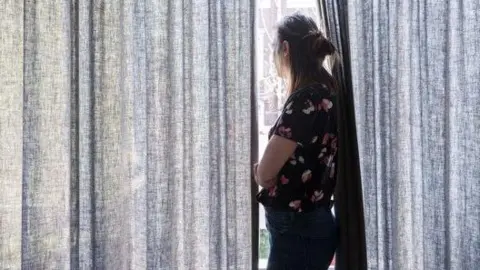Women lose two-child benefit cap 'rape clause' case
 Getty Images
Getty ImagesTwo women who conceived their eldest children when they were in abusive relationships have lost a legal challenge to rules around the so-called "rape clause" to the two-child benefit cap.
The non-consensual conception exception allows universal credit (UC) recipients to claim benefits for more than two children - but only if the third or subsequent children were conceived non-consensually.
The mothers brought legal action against the Department for Work and Pensions (DWP), saying the rules breached their human rights.
A DWP spokesperson said victims of rape and coercion should be treated with "dignity and respect" but the court decision was about how the policy was being implemented.
The policy leaves some women unable to use the exception if their first two children are conceived in rape but they have further children in consensual relationships.
A previous hearing at Leeds Administrative Court heard both women were young and vulnerable when they began relationships in their teens and first became pregnant.
Karon Monaghan KC, representing the women, said both were subject to regular violence and coercion.
The first woman conceived her two eldest children through rape and was told she could not claim the benefit for her third and fourth children, both of whom were conceived consensually in a later long-term relationship.
She was initially paid the child element of UC for the third child, but this was later cancelled, after the fourth child was born.
The second woman, a mother of six, was subjected to domestic abuse and violent and coercive behaviour by former partners with whom she had children.
Ms Monaghan said she had older children in care and two living with her, but then one of the older children returned to her home.
She was refused an exception to the two-child limit under these "ordering provisions".
The Child Poverty Action Group (CPAG), which provided the women's legal representation, said that while the first woman was eventually granted an exception for her youngest child, she went for years without.
They said this amounted to thousands of pounds of support which will not be backdated.

Mrs Justice Collins Rice said the two women were survivors of "appalling relationship abuse" which involved "sustained physical, sexual and psychological violence".
But she also said their argument is part of the "intensely controversial" political debate about the two-child benefit cap.
She said the issue must be resolved in the "political arena" and "the forum of public opinion".
Ms Collins Rice concluded: "It is also a question with potential resonances in family law more generally... it is a political law reform question."
Responding to the judgment, the first woman said the decision was "disappointing" but that she would "keep going and fight this to the end".
"All of my choices were taken away from me for years by my abuser before I fled," she said.
"I've fought hard to get on with my life for me and my kids."
Claire Hall, the CPAG solicitor who represented the women, said the organisation would look to appeal the decision.
She said that "in the meantime all eyes are on the government which has the chance to do the right thing and abolish the inhumane two-child limit in the autumn child poverty strategy".
The DWP spokesperson said: "Violence against woman and girls is a national emergency - and our mission is to halve it within a decade.
"This policy will be considered along with all other levers including social security reform by the Child Poverty Taskforce and the Child Poverty Strategy will be published in the autumn."
Listen to highlights from West Yorkshire on BBC Sounds, catch up with the latest episode of Look North.
